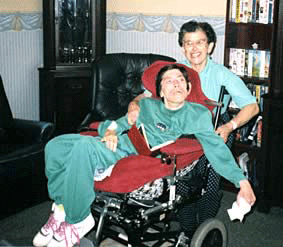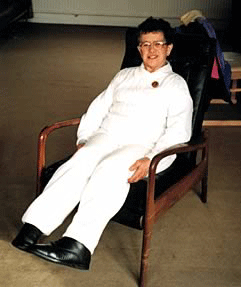You are here
Chapter 4
My working life
I worked at Purley Hospital for 13 to 14 years and I quite liked it there. I left Whyeleafe House and moved into the staff hostel on October 30th 1972. My father died in 1973, the first year I was there. I was 33 when I started and I did domestic work - washing up, cleaning and doing things like that. Then as time went on I started operating a machine for scrubbing the theatre at Purley. The chap in charge showed me how to use it and, of course, it used to run away with me at times. But I got used to it, I got the hang of it. I think I was getting paid for doing the machine operating as well. I quite enjoyed that because it gave me a bit more confidence in using machines. When they didn't have anyone else to operate the machine they asked me would I do it. When I did, I had to get up there really early to work, to get over there and do it before they started in the operating theatre. That's when it was a General and had a theatre, but now they use it for day care, occupational health, OT.
I quite enjoyed being there because the domestic staff was very good. They used to help and even the staff on the wards were good, they used to have parties at Christmas. The doctors were very good. I used to make tea for them sometimes. I used to like tea-making. And even the supervisors - some of the supervisors, not all of them - I liked them as well. I mean I liked being there as it was before, but I wouldn't go back there now.
I was sent to Queen's Hospital in Croydon for a while, while they were upgrading Purley because they were doing away with their theatre. I used to talk to the patients and the staff at the same time as working. I mean, I used to have to take their water jugs to the kitchen, wash them up, fill them with water and then put them back. I used to chat to people while I was doing it. That's how you get friendly and it stops them from getting nervous and that when they're going into the theatre or whatever.
They was good days then, though I used to do split duties, which I didn't like. The evening staff, when they'd finished their work, they'd come and help us so that we could get off. We did half past one to 8 o'clock; half past seven we used to finish and we would go off at 8. I kept in touch with Muriel. I still went to see her on my days off. When I'd finished I used to go up there and then come back. I'd never forget her.
The hospital was upgraded to a geriatrics hospital and, of course, then the staff home where we were living. It is now all offices or for day care use, where they can do things with Occupational Health or whatever. There are other people, I suppose, what go there who need it - although they still have Casualty, at least I think they still have Casualty, or X-ray departments in the Out Patients.

I could have gone back there but I didn't, I wanted to try and go up to St Lawrence's. I wanted to be near Muriel. I got a job there and then I was working at St Lawrence's as a domestic, I was on the domestic staff. I used to work on what they called the 'low grade' wards, like E3. I worked on those wards as a domestic. I stayed living at Purley for a while then I moved into Foxley Lane. That was at Isabel's. I was there six years. She didn't have many in those days, only three of us. Then it got too big, too many, and I decided I wanted to move and go to a smaller place. I asked Anne Evans who was my Adult Placement Officer in those days if I could leave Isabel's and go to another place.
She took me to tea one day, to Norah's, where I live now, to have a cup of tea. And then I saw this dog - they had a dog - and I thought, oh, I'd like that. She came to me straight away. Norah said they wanted somebody who didn't smoke and, of course, I don't smoke. None of them smoke. And they said when could I move in? I've been there ever since, for ten years, since December 2nd 1988, just near enough to Christmas.
At St Lawrence's I was doing what they call 'floating', going from ward to ward. And then I got fed up some days. Because when you are in the middle of doing one job and somebody doesn't come in, you've got to go and cover for them, and I didn't like that. One morning I went to one of the male wards and it's choc-o-bloc in the kitchen. I couldn't stand it any more. I was up to here, fed up with it. I mean, I wouldn't mind if they'd piled the dishes up in neat piles so you'd know where you were going to start from. But no, it's all over the place, the crockery, all over the place. Never ending it was. Washing up, washing up! I wanted to get away from there.
One day I felt I'd had enough. I just stood there and said, "Goodbye, I'm going!" I didn't go without telling them in the office. I said "I'm going now. I'm fed up with this lot!" They didn't stop me. I thought, well, I'll get my bag and my coat, I'm off. And from there I didn't go back to the wards, I went to one of the houses near the gates of St Lawrence's, called Elmwood. It's a house attached to the hospital. It's a group of eight, I think there were about four men and four girls, eight altogether. From there they went to Stroud Green, which is a home still under Lifecare Trust.

I was doing the same work there. I quite liked being there. I mean they were very good, they were the kind of people who could do things for themselves; wash up, dress themselves, make their own beds. I did some of the washing up, especially in the mornings when they were getting ready to go out and I'd do the hoovering upstairs, and the toilets and things like that, before they went out. I shaved one of the people who couldn't shave himself. I used to do the ironing as well for them, in the afternoons, when they'd all gone out.
That was only a small house. Ophelia, the sister-in-charge, was quite nice. She often used to send me out to get a paper and other things. From there I went to the Doreen Firman day centre. Sometimes I used to have to take from there a couple of people who had to go to the dentist and take them back later, with their casenotes. On other days I went over to the Doreen Firman centre and worked over there for a while. This was a centre for day care. It was in the grounds of the hospital, where they used to go in the day and they finished that about 4 o'clock. I used to go swimming in the evenings and take Muriel to watch, with the staff. Coming out I used to take my swimming things with me and go swimming in the evening, when I stayed with Muriel, like Wednesdays and Thursdays.
I was working there and I saw this advert in the paper for Highfield Road. It was like a transfer as a domestic to Highfield Road as they were patients from Lifecare too. I used to work there, and then in 1994 I got made redundant. That's when I became an advocate for Muriel, a registered advocate. And that was the year she left St Lawrence's and went to Whitehill House to live. It's a home for 13 clients. It's quite a nice houseand they've got a big kitchen.
Contact us
About the Group
If you woud like to get in touch with the Social History of Learning Disability (SHLD) Research Group, please contact:
Liz Tilley
Chair of the Social History of Learning Disability (SHLD) Research Group
School of Health, Wellbeing and Social Care
Faculty of Wellbeing, Education and Language Studies
The Open University
Walton Hall
Milton Keynes
MK7 6AA
About the website
If you have any feedback or would like to report a problem with the website, please contact WELS-Research-Admin@open.ac.uk.